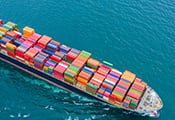Top 5 Shipping Lines of 2025
As global trade evolves, shipping lines are crucial in keeping goods moving efficiently. Here are the top five shipping companies leading the industry in 2025:
1. Mediterranean Shipping Company (MSC)
MSC, established in 1970, has become the world's largest container shipping company, with a fleet capacity of approximately 25 million twenty-foot equivalent units (TEUs) across 850 vessels, capturing a 20% market share.
Pros:
- Extensive Global Network: MSC operates in more than 520 ports across 155 countries, offering Indian exporters extensive international connectivity, mainly to Europe and North America.
- Diverse Service Offerings: MSC provides solutions for dry cargo, reefer cargo (temperature-sensitive goods), and oversized shipments, making it suitable for various industries, including pharmaceuticals and perishables.
- Strong Market Reputation: The company is known for its vast resources and financial stability, ensuring consistent service availability even during volatile market conditions.
Cons:
- Variable Service Quality: Service levels may fluctuate based on regional operations, and some customers have reported inconsistencies in communication and responsiveness.
- Limited Digital Integration: Compared to competitors like Maersk, MSC’s digital tracking tools are not as advanced, making real-time monitoring slightly less efficient.
2. Maersk Line
Maersk Line, headquartered in Denmark, is globally recognised for its extensive fleet and cutting-edge logistics solutions. With a fleet capacity of approximately 4.4 million TEUs across 740 vessels, Maersk holds a 14.3% market share.
Pros:
- Robust Presence in India: Maersk has a significant footprint in major Indian ports, offering tailored solutions for Indian businesses exporting textiles, automotive parts, and IT products.
- Advanced Digital Platforms: Maersk has a strong focus on digitisation, offering sophisticated tools for booking, tracking, and managing shipments, improving transparency and operational efficiency.
- Sustainability Initiatives: The company is investing in green shipping, including carbon-neutral vessels and alternative fuel solutions, which aligns with India’s growing focus on sustainable trade practices.
Cons:
- Premium Pricing: Maersk's advanced services and reliability come at a higher cost, which may not be feasible for cost-sensitive businesses.
- Capacity Constraints: Due to high demand, securing space on Maersk vessels can be challenging during peak seasons, leading to potential delays in shipment scheduling.
3. CMA CGM
CMA CGM, a French shipping giant, operates a fleet with a capacity of approximately 23.6 million TEUs across 650 vessels, capturing a 12.2% market share as of 2024.
Pros:
- Strong Presence in India: CMA CGM has a well-established logistics network in India, providing direct access to global trade routes. This makes it an ideal choice for Indian businesses looking to ship products to the US, Europe, and the Middle East.
- Technological Innovation: The company has heavily invested in digital tracking, AI-driven logistics solutions, and blockchain-enabled documentation, ensuring smooth and secure transactions.
- Specialised Cargo Solutions: CMA CGM is known for its expertise in handling fragile, hazardous, and high-value goods, ensuring proper safety measures.
Cons:
- Higher Freight Rates: Due to its premium services, CMA CGM often charges higher freight rates than its competitors.
- Port Congestion Issues: The company has faced delays in certain regions due to congestion at major transhipment hubs, potentially impacting delivery timelines.
4. COSCO Shipping Lines
COSCO, a Chinese state-owned enterprise, commands a fleet capacity of approximately 3.3 million TEUs across 538 vessels, representing a 10.6% market share.
Pros:
- Strategic Alliances: As part of the Ocean Alliance, COSCO offers extensive route options and flexible shipping schedules, benefiting Indian businesses that require multiple transhipment options.
- Competitive Pricing: COSCO is known for providing cost-effective shipping solutions, making it attractive for Indian exporters looking to minimise logistics costs.
- Strong Presence in Asia: With robust connections in the Asia-Pacific region, COSCO is ideal for Indian businesses exporting goods to China, Japan, and Southeast Asian markets.
Cons:
- Geopolitical Sensitivities: As a state-owned entity, COSCO’s operations can be influenced by international trade tensions, potentially leading to service disruptions.
- Service Variability: Some customers have reported inconsistent service quality, particularly regarding customer support and response times.
5. Hapag-Lloyd
Hapag-Lloyd, based in Germany, operates a fleet with a capacity of approximately 2.3 million TEUs across 300 vessels, holding a 7% market share.
Pros:
- Reliable Service: Hapag-Lloyd is recognised for its punctuality and strong track record in maintaining delivery schedules, which is crucial for time-sensitive shipments.
- Sustainability Initiatives: The company is heavily investing in reducing its carbon footprint by using eco-friendly fuels and energy-efficient vessels.
- Customer-Centric Approach: Known for excellent customer service, Hapag-Lloyd provides real-time tracking and proactive communication regarding shipment status.
Cons:
- Limited Coverage in Emerging Markets: Hapag-Lloyd's network is not as extensive in some emerging markets, requiring transhipment through other carriers, leading to longer transit times.
- Higher Costs for Premium Services: Enhanced services and sustainability initiatives may result in higher shipping costs than budget-friendly competitors.
Key Factors to Consider When Choosing a Shipping Line
The right shipping line is important for cost efficiency, timely deliveries, and smooth logistics. Here are the key factors to keep in mind when making your decision:
- Global Coverage and Routes: Ensure the shipping line operates on your desired trade routes, especially for Indian exporters targeting the US, European, and Middle Eastern markets.
- Shipping Costs and Surcharges: Compare freight rates, fuel surcharges, peak season charges, and security fees to determine overall logistics costs.
- Transit Time and Schedule Reliability: Check for historical on-time performance and flexibility in schedule adjustments.
- Cargo Handling and Safety Measures: Evaluate how well the shipping line manages fragile, perishable, and hazardous goods.
- Customer Service and Digital Tracking: Consider digital capabilities for tracking shipments and ease of customer support access.
- Sustainability Initiatives: With increasing regulations on carbon emissions, partnering with eco-friendly shipping lines can enhance corporate sustainability goals.
Related: Products to Export from India
Learn more about Marine Insurance
Common Challenges in Choosing a Shipping Line
Selecting a shipping line presents several challenges that can impact business operations. Understanding these issues helps make informed decisions:
- Port Congestion and Delays: Major ports like Mumbai, Chennai, and Kolkata often face congestion, leading to shipment delays, especially during peak seasons. To manage this, businesses should work with shipping lines that offer multiple port options, have established contingency plans and provide real-time tracking to manage delays efficiently.
- Customs and Regulatory Issues: Customs rules vary across countries, and exporters must ensure their chosen shipping line understands these regulations. While reforms like GST have improved transparency in India, customs delays still pose risks. Partnering with a shipping line with strong customs support can help avoid unexpected costs and delays.
- Capacity Constraints: High demand during festive seasons or holidays can limit available shipping space, causing delays. Choosing shipping lines with flexible scheduling and contingency options helps mitigate this risk.
- Pricing Volatility: Freight rates fluctuate due to fuel prices, demand shifts, and currency changes. Indian exporters must monitor these trends and work with shipping lines offering stable, transparent pricing.
Related: What is Freight Forwarding RFP?
How Does Marine Insurance Support Safe & Reliable Shipping?
Marine insurance protects shipments from various risks, especially in international shipping. Here are some of the advantages of this insurance:
- Covers Loss or Damage During Transit: Shipping is exposed to multiple risks, including rough weather, accidents, and mishandling. Cargo insurance helps businesses recover financial losses if goods are lost or damaged in transit. For Indian exporters, it safeguards against unforeseen challenges, particularly when transporting valuable products over long distances.
- Protection Against Piracy, Natural Disasters, and Accidents: Marine insurance covers threats like piracy and damage from natural disasters beyond routine transit risks. This is especially relevant on routes such as the Arabian Sea, where piracy remains a concern. Given the uncertainties of global trade, such coverage helps businesses stay prepared.
- Ensures Financial Stability for Exporters and Importers: Marine insurance's key advantage is financial protection. Indian exporters and importers can minimise unexpected losses and maintain steady cash flow. Choosing a dependable insurance provider with comprehensive coverage is essential for effective risk management.
Conclusion
Evaluating shipping lines based on cost, coverage, and reliability is key to minimising risks and optimising supply chains. Businesses must assess factors like transit times, service quality, and digital tracking capabilities to make informed decisions.
Additionally, marine insurance protects shipments from losses due to accidents, natural disasters, or piracy. At Policybazaar for Business, we help Indian businesses explore and compare marine insurance options to protect their shipments and enable smooth, cost-effective global trade with reliable financial protection.






































 Expert advice made easy
Expert advice made easy


